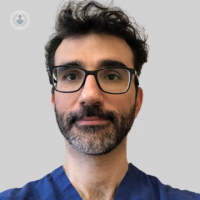A comparison between laparoscopic and open inguinal hernia surgery
Written by:In this article here, Mr Eriberto Farinella, an esteemed consultant general surgeon, details what laparoscopic and open inguinal hernia surgery are, how both are performed, and what the advantages of both surgical techniques are.

What is laparoscopic surgery? What is open surgery?
These are two different surgical approaches to treating inguinal hernias. Open surgery is the traditional approach of making a cut in the groin, where the inguinal hernia is.
On the other hand, laparoscopic surgery is a minimally invasive approach whereby we put a camera through the bellybutton and we operate from inside the abdominal cavity.
Are both surgical approaches suitable for inguinal hernias?
Yes, they are. Of course, it depends on the patient and the type of hernia in question. I would say that laparoscopic surgery is the preferrable option.
What are the advantages of both laparoscopic and open inguinal surgery?
There are many advantages when it comes to open surgery. Firstly, it is a quick procedure that is normally performed within an hour. Most of the time, open inguinal surgery is performed under general anaesthetic but can be done under spinal or other regional anaesthesia. These are good options for high-risk patients.
In relation to laparoscopic inguinal surgery, there is a lot less post-operative pain involved. Not only that, but recovery is quicker than recovery from open inguinal surgery. Another advantage of laparoscopic inguinal surgery is that there is a lesser risk of complications. We can also prevent femoral hernias from occurring when laparoscopic inguinal hernia surgery is performed.
Another advantage of laparoscopic inguinal surgery is that the risk of recurrence is greatly reduced. There is also less risk of touching or interfering with the nerve in the groin.
How does a surgeon decide whether laparoscopic or open inguinal hernia is more suitable for a patient?
Patients need to be aware of both options. It depends on the patient and various factors. If the patient has undergone previous surgery, there is a risk of multiple scarring in the abdominal cavity, so laparoscopic surgery might not be suitable.
If the patient is high-risk from an anaesthetic point of view, then they would be more suited for open surgery due to the fact that they could have regional anaesthesia.
Which of the two has a better success rate?
The difference between the two is relatively small. It really depends on what the patient wants to achieve. Both techniques have an equally high success rate.
To book an appointment with Mr Eriberto Farinella, simply visit his Top Doctors profile today.


